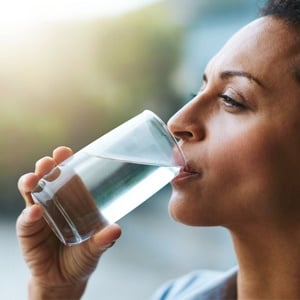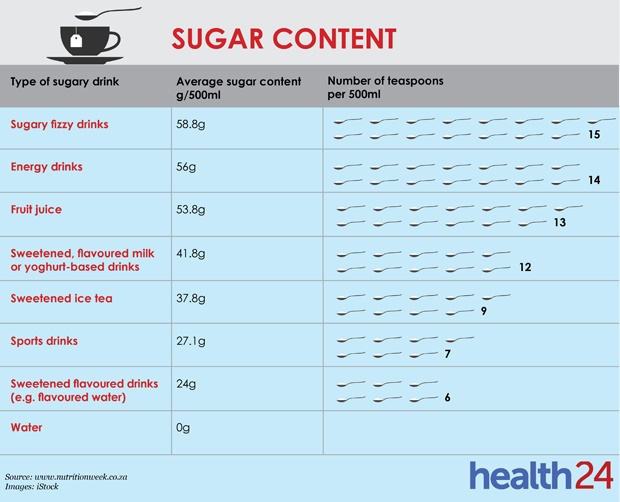
We all know you have to drink enough water every day, but it can be challenging. It’s easier to drink a sugar-filled drink rather than a glass of water but water contains zero kilojoules, keeps you hydrated and is essential for your health.
This year's theme for National Nutrition Week 2017 (which ran from 9 to 15 October) is: “Rethink your drink – choose water.” This week the spotlight is on National Obesity Week.
When you choose a sugar-sweetened drink, you spike your daily kilojoule intake, which can lead to weight gain and the onset of non-communicable disease like type 2 diabetes, heart disease and dental cavities.
In fact, research shows that drinking two or more sugary drinks per day has been found to increase the risk of developing diabetes by at least 24% compared to consuming only one or zero sugary drinks per month.
How much sugar are you drinking?
The World Health Organization says our intake of free sugars should be less than 10% of the total daily energy intake for adults and children.
Free sugar is the sugar added by the manufacturer, cook or consumer, or the sugars naturally present in honey, syrups, fruit juices and fruit-juice concentrates.
“This means that the maximum intake of free sugars from food and beverages per day for adult men and adolescents (14–18 years) should not be more than 12 teaspoons, and for adult women and children 5–13 years, not more than nine teaspoons,” says Nicole Lubasinski, president of the Association for Dietetics in South Africa (ADSA).
“To achieve more health benefits, the number of teaspoons of sugar from food and beverages per day for adult men and adolescents (14–18 years) should not be more than six teaspoons, and for adult women and children 5–13 years, not more than five teaspoons.”
On average, commercially produced sugary drinks contain the following amounts of sugar per 500ml serving (two average-sized cups/glasses):

Understanding food labels
“Some sugary drinks have a nutrition information label; this will indicate how much of the carbohydrate in the drink is found as sugar,” says Carol Browne of the Nutrition Society of South Africa (NSSA).
“Sugar is one of the primary ingredients in drinks, and so it will be listed high up on the list of ingredients. In milk-based drinks, some of the sugar will be the sugar from milk, and this is not classified as a ‘free sugar’. In these products the total sugar content on nutrition information label should be considered with the ingredient list.”
Obesity and non-communicable diseases
“The prevalence of obesity and non-communicable diseases in the country is alarming,” says Rebone Ntsie, Director: Nutrition, of the National Department of Health.
“The South African Demographic and Health Survey conducted in 2016 found that the prevalence of overweight [people] was 13.3% among children 0–5 years of age. About 67.6% and 31.3% of South African women and men respectively are overweight and obese. These findings show that overweight and obesity among children and adults have increased from earlier surveys. Replacing sugary drinks with water can help.”
The risk of coronary heart disease and ischaemic stroke also rises with an increase in body weight.
Professor Pamela Naidoo, CEO of the Heart and Stroke Foundation South Africa, warns, “There is also a clear link between sugary drink consumption and heart disease. Indicators of heart disease such as blood lipids and uric acid also increase with an increase in consumption of sugary drinks.”
How to increase your intake of water
Abigail Courtenay, registered dietitian and spokesperson for ADSA, offers a few simple suggestions on how to increase your intake of water.
1. Always carry water with you.
2. Set reminders on your phone or notes at your desk every hour.
3. Make sure you drink water with your meals.
4. Always drink water before and after exercising.
5. Give your child a bottle of water to take along to school.
“You can also add fresh slices of lemon, cucumber, mint leaves, lime or fresh fruit to your water or unsweetened rooibos or herbal teas to add more flavour,” adds Courtenay.
Image credit: iStock




 Publications
Publications
 Partners
Partners














